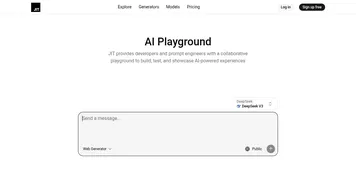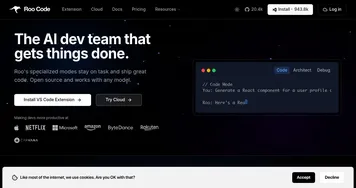Sourcery
Sourcery is an AI-powered code review tool that analyzes pull requests, catches bugs, and improves code quality across 30+ languages in GitHub, GitLab, and IDEs like VS Code and JetBrains. It provides instant feedback, line-by-line suggestions, and summaries with diagrams. The tool integrates seamlessly, offering real-time reviews in IDEs and automated checks on platforms like GitHub. It supports team style guides and adapts to user feedback for better reviews over time. Security features include no code storage, zero-retention LLM options, and self-hosted deployments.
Key features include Pull Request Reviews, which deliver detailed feedback and visual summaries, and Continuous Learning, which refines suggestions based on user input. Enterprise Security ensures data protection, with options to avoid external servers. Sourcery’s Review Guides generate diagrams to clarify complex changes, and its IDE integration catches issues pre-commit. Compared to DeepCode (part of snyk) and Codacy, Sourcery excels in real-time IDE feedback, though DeepCode may offer more granular static analysis.
Sourcery supports over 30 languages, including Python, JavaScript, and Java, and works with tools like Sentry for issue tracking. The free tier covers open-source projects, with paid plans for private repos and enterprises, competitive with similar tools. Setup is straightforward but requires configuration for optimal results. Recent user feedback on Reddit highlights its speed but notes occasional overzealous style suggestions.
Drawbacks include a learning curve for customizing rules and potential suggestion overload for new users. Some GitHub reviewers mention that minor style fixes can dominate feedback if not tuned properly. The tool’s focus on AI-driven reviews may not suit teams preferring human-only processes. Pricing for private repos aligns with competitors but may feel steep for small teams.
To use Sourcery effectively, start with the free trial for open-source projects. Configure custom rules early to align with your team’s coding standards. Explore IDE integration for real-time feedback, and consider self-hosted options for sensitive projects. Check the Slack integration for streamlined issue tracking.
Video Overview ▶️
What are the key features? ⭐
- Pull Request Reviews: Provides line-by-line feedback and summaries for GitHub and GitLab pull requests.
- Continuous Learning: Adapts review suggestions based on user feedback and team preferences.
- Review Guides: Generates diagrams and summaries to clarify complex code changes.
- Enterprise Security: Offers no code storage and self-hosted options for data protection.
- IDE Integration: Delivers real-time feedback in VS Code, JetBrains, and Cursor before committing.
Who is it for? 🤔
Examples of what you can use it for 💭
- DevOps Engineer: Uses Sourcery to catch security issues in CI/CD pipelines before deployment.
- Python Developer: Relies on IDE integration for real-time feedback on Python code in VS Code.
- Team Lead: Enforces team coding standards across GitHub repos with custom review rules.
- Open-Source Contributor: Leverages the free tier to improve code quality in public projects.
- Security Analyst: Monitors Sentry issues with Sourcery’s Slack integration for quick fixes.
Pros & Cons ⚖️
- Supports 30+ languages
- Visual review summaries
- Free for open-source
- Overzealous style suggestions
- Paid plans for private repos
FAQs 💬
Related tools ↙️
-
 Open WebUI
Enables offline AI interactions with LLMs, integrating document and web content
Open WebUI
Enables offline AI interactions with LLMs, integrating document and web content
-
 JIT.dev
An AI-powered tool that transforms your text inputs into code
JIT.dev
An AI-powered tool that transforms your text inputs into code
-
 B12
An easy-to-use AI website builder that helps professional service providers attract and serve clients online
B12
An easy-to-use AI website builder that helps professional service providers attract and serve clients online
-
 PagePilot.ai
Using AI to create product pages for online stores
PagePilot.ai
Using AI to create product pages for online stores
-
 Zarla
Create a beautiful website in seconds - let the AI write, design, and build one for you
Zarla
Create a beautiful website in seconds - let the AI write, design, and build one for you
-
 Roo Code
Assists developers in coding, refactoring, and debugging via AI agents in VS Code
Roo Code
Assists developers in coding, refactoring, and debugging via AI agents in VS Code

